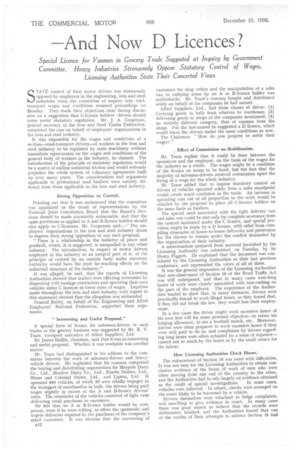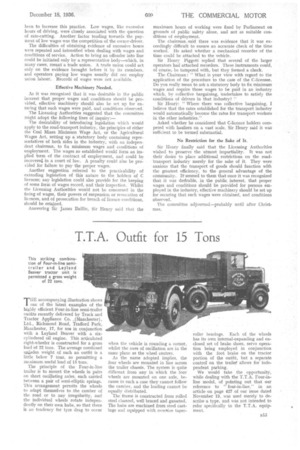And Now D Licences?
Page 46

Page 47

If you've noticed an error in this article please click here to report it so we can fix it.
Special Licence for Vanmen in Grocery Trade Suggested at Inquiry by Government Committee. Heavy Industries Strenuously Oppose Statutory Control of Wages. Licensing Authorities State Their Concerted Views
STATE control of their motor drivers was strenuously opposed by employers in the engineering, iron and steel industries when the committee of inquiry into roadtransport wages and conditions resumed proceedings on Monday. They made their objections clear during discussion on a suggestion that C-licence holders' drivers should come under statutory regulation, Mr. J. A. Gregorson, general secretary of the Iron and Steel Trades Federation, submitted the case on behalf of employers' organizations in the iron and steel industry. It was impossible for the wages and conditions of a section—road-transport drivers—of workers in the iron and steel indastry to be regulated by state machinery without immediate repercussion on the wages and conditions of the general body of workers in the industry, he claimed. The introduction of the principle of statutory regulation would be a source of endless industrial friction and would seriously prejudice the whole system of voluntary agreements built up over many years. The considerations and arguments applicable to professional road hauliers were entirely different from those applicable to the iron and steel industry.
Strong Opposition to Control.
Pointing out that it was understood that the committee was appointed as the result of representations by the National Joint Conciliation Board that the Board's decisions should be made statutorily enforceable, and that the same provisions as applied to A and B-licence holders should also apply to C-licensees, Mr, Gregorson said:—" The employers' organizations in the iron and steel industry desire to express their strong opposition to any such proposal. "There is a relationship in the industry of peace and goodwill, which, it is suggested, is unequalled in any other industry. The introduction, in respect of motor drivers employed in the industry as an integral part of it, of the principle of control by an outside body under statutory authority would have the most far-reaching effects on the industrial structure of the industry."
It was alleged, he said, that the reports of Licensing Authorities showed that traders were effecting economies by dispensing with haulage contractOrs and operating their own vehicles under C licences at lower rates of wages. Inquiries made throughout the iron and steel industry with regard to this statement showed that the allegation was unfounded.
General Bailey, on behalf of the Engineering and Allied Employers' National Federation, supported these arguments.
"Interesting and Useful Proposal."
A special form of licence for salesmen-drivers in such trades as the vocery business was suggested by Mr. R. V. Teare, transport executive of Allied Suppliers, Ltd.
Sir James Baillie, chairman, said that it was an interesting and useful proposal. Whether it was workable was another matter.
Mr. Teare had distinguished in his address to the committee between the work of salesmen-drivers and heavyvehicle drivers. He explained that his concern comprised the buying and distributing organization for Maypole Dairy Co., Ltd., Meadow Dairy Co., Ltd., Pearks Dairies, Ltd., Home and Colonial Stores, Ltd., and Liptcin, Ltd, It operated 600 vehicles, of whict 50 were wholly engaged in the transport of merchandise in bulk, the drivers being paid wages slightly in excess of the A and B-licence drivers' rates. The remainder of the vehicles consisted of light vans delivering retail purchases to customers.
He felt that no A or B-licence holder would be competent, even if he were willing, to effect the spasmodic and urgent deliveries required by the purchases of the company's retail customers. It was obvious that the canvassing of n12 customers for shop orders and the manipulation of a sales van in outlying areas by an A or B-licence holder was unthinkable. Mr. Teare's concern bought and distributed solely on behalf of the companies he had named.
Allied Suppliers, Ltd., had three classes of driver: (1) Carrying goods in bulk from wharves to warehouse; (2) delivering goods to shops of the companies mentioned; (3) an entirely different category, that of vanraen from the shops. For the last-named he suggested a D licence, which would leave the drivers under the same conditions as now.
The Chairman: "How do you propose to settle their wages? "
Effect of Commission on Stabilization.
Mr. Teare replied that it could be done between the operatives and the employer, on the basis of the wages for the industry as a whole. The wages might be a condition of the licence on terms to be fixed, but the fact that the majority of salesmen-drivers received commission upset the fixing of a wage for the whole industry.
Mr. Teare added that to impose statutory control on drivers of vehicles operated solely from a sales standpoint would create much confusion in the trade. An increase in operating cost out of all proportion to the work would be entailed by the proposal to place all C-licence holders on the same basis as hauliers.
The special need associated with the light delivery van and sales van could be met only by complete severance from the control instituted under the C licence, and special provision might be made by a D licence, with relief from compiling itineraries of house-to-house deliveries and permission for the drivers to remain under the control demanded by the organization of their industry.
A memorandum prepared from material furnished by the Licensing Authority was submitted, on Tuesday, by Sir Henry Piggott. He explained that the document was considered by the Licensing Authorities at their last previous conference, and represented the views of all of them. It was the general impression of the Licensing Authorities that non-observance of Section 19 of the Road Traffic Act was still widespread, and that in many cases Over-long hours of work were closely associated with rate-cutting on the part of the employer. The experience of the Authorities tended to show that, in many instances, drivers were practically forced to work illegal hours, as they feared that, if they did not break the law, they would lose their employment.
In a few cases the driver might work excessive hours of his own free will for some personal objective—to retain his lodging allowance, to see a football match, etc. Moreover, drivers were often prepared to work excessive hours if they were well paid to do so, and complaints by drivers regarding long hours were often actuated by a sense of injustice—. caused not so much by the hours as by the small return for the labour.
How Licensing Authorities Check Hours.
The enforcement of Section 19 was beset with difficulties. It was not easy for the Licensing Authorities to obtain conclusive evidence of the hours of work of men who were often moving from one end of the country to the other, and the Authorities had to rely largely on evidence obtained as the result of special investigations. In some cases, vehicles were followed. In others, checks were arranged on the route likely to be traversed by a vehicle.
Drivers themselves were reluctant to lodge complaints, and unwilling to give evidence in court. In many cases there was good reason to believe that the records were deliberately falsified, and the Authorities feared that one of the results of their attempts to enforce Section 19 bad
been to increase this practice. Low wages, like excessive hours of driving, were closely associated with the question of rate-cutting. Another factor tending towards the payment of low wages was the competition of the owner-driver.
The difficulties of obtaining evidence of excessive hours were repeated and intensified when dealing with wages and conditions of service. Action to bring an offender into line could be initiated only by a representative body—which, in many cases, meant a trade union. A trade union could act only on the evidence brought before it by its members, and operators paying low wages usually did not employ union labour. Record § of wages were not available.
Effective Machinery Needed.
As it was recognized that it was desirable in the public interest that proper wages and conditions should be provided, effective machinery should also be set up for ensuring that such wages were paid, and conditions observed.
The Licensing Authorities suggested that the committee might adopt the following lines of inquiry:— The desirability of introducing legislation which would apply to the road-transport industry, the principles of either the Coal Mines Minimum Wage Act, or the Agricultural Wages Act, setting up a statutory body, containing representatives of both sides in the industry, with an independent chairman, to fix minimum wages and conditions of employment. The wages so established would form an implied term of the contract of employment, and could be recovered in a court of law. A penalty could also be provided for failure to pay the proper wages.
Another suggestion referred to the practicability of extending legislation of this nature to the holders of C licences; any legislation could also provide for the keeping of some form of wages record, and their inspection. Whilst the Licensing Authorities would not be concerned in the fixing of wages, their powers of suspension or revocation of licences, and of prosecution for breach of licence conditions, should be retained.
Answering Sir James Bailliei Sir Henry said that the
maximum hours of working were fixed by Parliament on grounds of public safety alone, and not as suitable conditions of employment.
The chairman said there was evidence that it was exceedingly difficult to ensure an accurate check of the time worked. He asked whether a mechanical recorder of the time could be attached to the vehicle.
Sir Henry Piggott replied that several of the larger operators had attached recorders. These instruments could, of course, be tampered with, but they formed a check.
The Chairman: "What is your view with regard to the application of the procedure to the case of the C-licensee. Do you really mean to ask a statutory body to fix minimum wages and require those wages to be paid in an industry which, by collective bargaining, undertakes to satisfy the conditions of drivers in that industry? "
Sir Henri!: "Where there was collective bargaining, I believe that the rates established for the transport industry would automatically become the rates for transport workers in the other industries."
Asked whether he considered that C-licence holders competed with hauliers on a vast scale, Sir. Henry said it was sufficient to be termed substantial.
No Restriction for the Sake of It, Sir Henry finally said that the Licensing Authorities wished to preserve the utmost impartiality. It was not their desire to place additional restrictions on the roadtransport industry merely for the sake of it. They were anxious that the transport of goods should function with the greatest efficiency, to the general advantage of the community. It seemed to them that once it was recognized that it was desirable, in the public interest, that proper wages and conditions should be provided for persons employed in the industry, effective machinery should be set up for securing that such wages were obtained, and conditions observed.
The committee adjourned—probably until after Christmas.




















































































